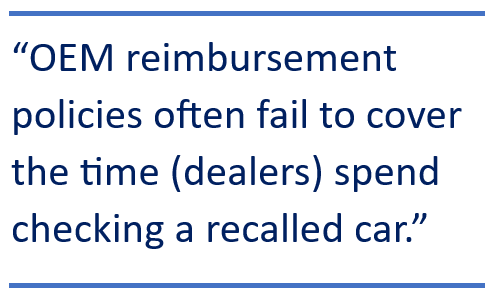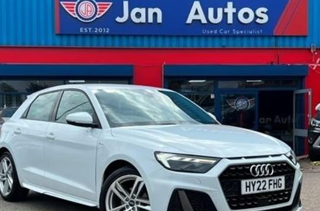Millions of recalled cars remain unrepaired on UK roads so franchised dealers are not only missing out on a crucial safety obligation but also a major commercial opportunity. Jon Sheard, operations director at ADS, shares why it’s time for dealers to rethink their approach to recalls - not as a cost, but as a powerful tool for customer retention and long-term profitability.
There’s no substitute for getting out there and talking to people on the ground when there’s an endemic problem. That’s what we’ve been doing to understand why franchised dealers are failing to rectify up to one in three cars that have been recalled by the manufacturer.
The numbers that we discovered through the Freedom of Information Act are shocking enough. As AM reported when we learned of this situation, 3.2 million cars recalled since 2018 are on the road, unrectified.
Even allowing for a time lag between recall and rectification, spikes in unseen recalls from 2022 and 2023 may also suggest a worsening picture. This is not sustainable. Not only does it pose the reputational risk of car brands being seen not to care about the safety of their customers, it’s squandering the chance to make substantial additional revenue.
Based on what we already know about the additional services booked by lapsed customers when they are re-contacted for a recall, franchised dealers are allowing more than £100 million to slip through their fingers by overlooking the potential value of these appointments.
So we’ve been consulting across the industry to better understand why.
Perhaps it’s an open secret, but the fact is that many workshops are resistant to focusing on recall checks or rectifications.
They’re under as much pressure as the sales teams to meet targets and the fact is that OEM reimbursement policies often fail to cover the time they spend checking a recalled car. What looks like a simple 15 minute job on a spreadsheet can often turn into 90 minutes of messing around with a seized up rusted bolt and that’s time they could be spending on a ‘real’ service or repair.
A campaign to bring in recalls from lapsed customers can mean a surge in such appointments which are seen as squeezing out other, more immediately profitable work. So the workshop manager sees little value in such initiatives.
But this is where franchised dealer leadership could perhaps be more emphatic about the true value of this kind of customer retention strategy. You can’t sell additional services or begin the process of a new car sale to an absent customer. And you can’t blame customers for shopping around for independent servicing, even if they’re arguably making false savings.
The only way around this is to stop losing track of customers in the first place and then to use every legitimate opportunity for contact – and they don’t come more legitimate than a safety recall.
 After that it’s a question of shifting away from the tunnel vision that only sees the immediate task in hand and appreciate the bigger picture. While someone is making that finicky check of a component that may not need replacing, someone else can be discussing the customer’s other needs and plans.
After that it’s a question of shifting away from the tunnel vision that only sees the immediate task in hand and appreciate the bigger picture. While someone is making that finicky check of a component that may not need replacing, someone else can be discussing the customer’s other needs and plans.
We have seen highly profitable results from the simple group-wide initiative of tying an imminent MOT or service in with a safety recall check. The convenience to the customer means they are more likely than not to get everything sorted out on the same day.
Of course, this means being able to contact the customers in the first place and that’s only possible with the discipline of regular – or even real-time – database cleansing. We are no longer surprised to find how many customer detail changes are otherwise missed, from new addresses to plate changes, when databases are not kept up to date.
It’s only human to focus on the more obviously interesting and immediately profitable work such as selling a new car or performing a major service, but it’s a serious and expensive mistake to neglect your previous customers.
Keeping a customer contact database up to date and using it to keep in touch at every opportunity might just look like marketing, but it’s also doing the right thing by your customers when their car may be unsafe or inefficient.
Millions of cars are recalled every year. That’s millions of opportunities that only franchised dealers have to strengthen customer relationships and intercept their drift to other service providers.
Tunnel vision in workshops and a reluctance among leaders to grasp the philosophy of customer retention is a lose-lose scenario, for dealers and their lapsed customers. This is frankly unjustifiable, when recalls present a unique opportunity for franchised dealers to make it a win-win.
Author: Jon Sheard, operations director, ADS



















Login to comment
Comments
No comments have been made yet.